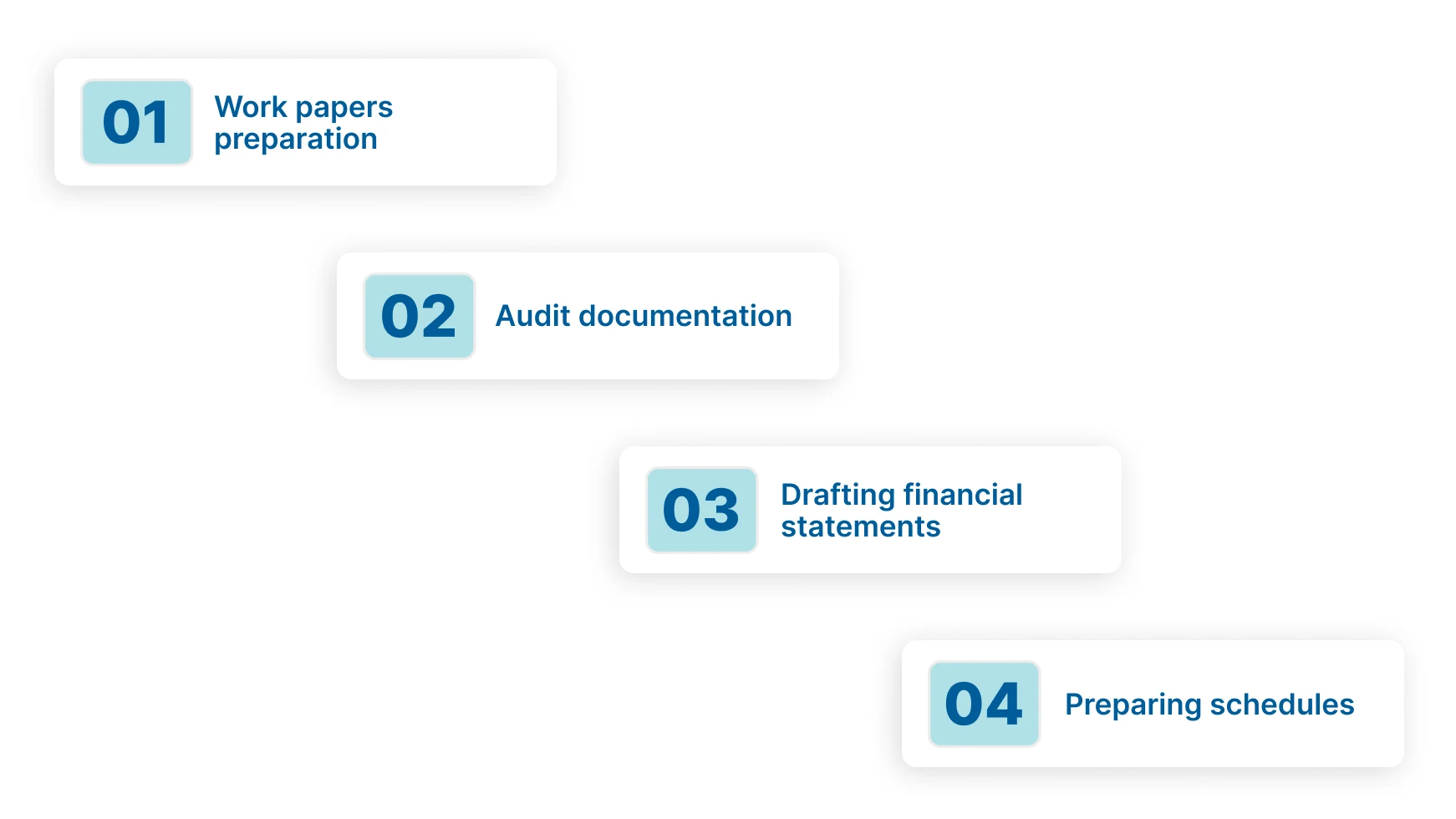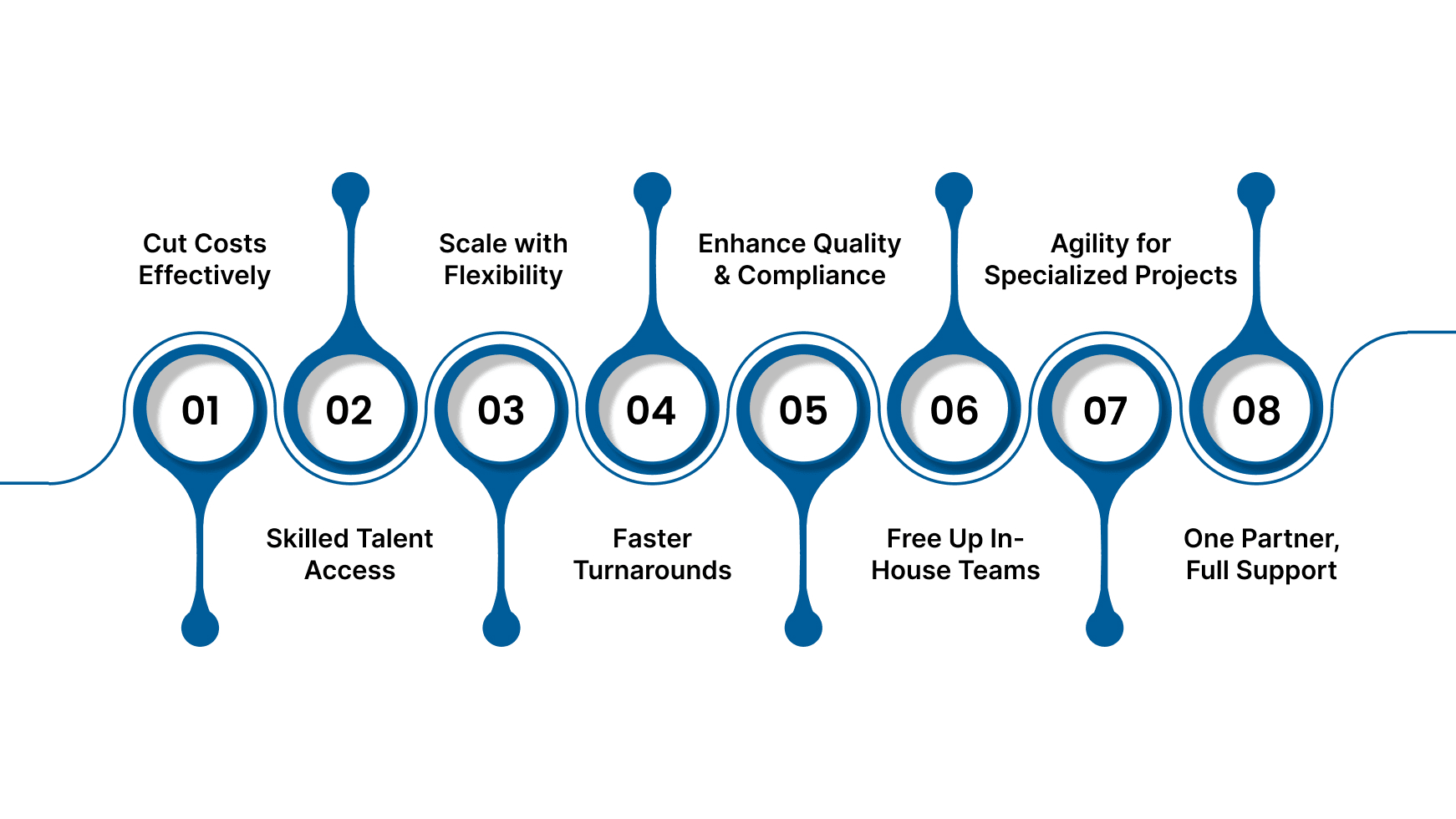%20(8).webp)
US CPA firms are under pressure from rising audit complexity, shrinking talent pools, and tighter deadlines. Traditional fixes like seasonal hiring or stretching in-house teams are proving unsustainable. Outsourcing audit support to India solves these bottlenecks. Skilled teams trained in US GAAS, PCAOB, and IFRS handle documentation-heavy tasks such as work papers, schedules, and statements. This frees US auditors to focus on judgment-driven and client-facing work.
The payoff: lower operating costs, faster turnarounds, and stronger compliance, without sacrificing quality. In this blog, we outline how outsourcing audit support to India helps US CPA firms scale, stay compliant, and deliver more value to clients.

Your internal auditors may excel at delivering audits, but the challenge often lies in managing high volumes of supporting tasks, such as:
During peak audit seasons, many firms find themselves short-staffed, relying on overextended or inexperienced team members. This affects deadlines and compromises the quality of work delivered to clients.
This is where audit outsourcing services to India add value. Unlike audit services (where CPAs issue direct audit opinions for businesses), audit support services provide specialized offshore assistance to CPA firms themselves.
Key features:
Example: A mid-sized CPA firm in Chicago faces a surge of year-end external audits. Instead of hiring temporary staff, the firm partners with an audit support outsourcing company in India to prepare work papers and draft financial statements. This frees the firm’s in-house auditors to focus on client-facing tasks like risk assessment and advisory, while meeting deadlines with accuracy.
Also Read: Why US Companies Choose to Outsource CAM Audit Services?
For many CPA firms, the question is how audit outsourcing creates measurable value. By outsourcing audit services to India, you gain more than just additional personnel; you unlock benefits that directly impact quality, scalability, and client satisfaction.

For USA CPA firms, outsourcing audit support to India translates to significant financial savings and solving the very real constraints of staffing, time, and compliance. Below, we break down the key advantages with practical details relevant to firms like yours.
One of the strongest drivers for outsourcing audit services to India is the ability to lower expenses while maintaining audit quality. It produces direct savings across multiple expense lines.
Detailed Cost Impact for CPA Firms:
Why It Matters: Outsourcing can save CPA firms up to 50% in operating costs, freeing up capital for growth and client service improvements.
India isn’t just about “cheaper labor.” Audit outsourcing firms in India give you access to large teams of qualified professionals trained in global standards.
What This Looks Like in Practice:
Example: A Boston CPA firm faced staff shortages during PCAOB inspections. By outsourcing review work to India, they can access auditors who have specific PCAOB audit training and avoid inspection penalties.
Audit workloads are not linear; they peak during the busy season and drop sharply after. Outsourcing gives you the flexibility to adjust capacity without long-term commitments.
The CPA Firm Reality:
How Outsourcing Solves It:
Pro Tip: Use outsourcing as a pressure valve during year-end audits. Firms that do this report fewer missed deadlines and improved staff retention since in-house teams aren’t burned out.
Time zones are often framed as a challenge, but for CPA firms, they’re an asset. The US–India time difference creates a round-the-clock audit cycle, cutting turnaround times dramatically.
The “Follow-the-Sun” Workflow:
Measured Impact: Firms report faster audit completion. CPA firms can cut the average audit cycle from 12 weeks to 8 weeks with offshore support.
Cost savings mean nothing if audit quality slips. That’s why outsourcing firms in India invest heavily in quality control and compliance standards.
Quality Assurance Layers:
Why It Matters: You get audit-ready deliverables that can pass PCAOB or peer reviews without rework.
Outsourcing doesn’t replace your auditors; it lets them focus on what clients value most. By shifting routine audit support tasks offshore, your in-house auditors can focus on building client relationships and driving revenue.
Here are the tasks your staff can prioritize instead of repetitive audit workflows:
Regulatory changes and client requests don’t always align with your capacity. Outsourcing gives you agility. Beyond seasonal spikes, outsourcing also helps firms adapt to sudden regulatory or client-driven demands.
Common Use Cases:
Outsourcing partners in India provide an integrated suite of audit support services, reducing the need for multiple vendors.
Why It Matters: One partner ensures consistent quality, reduces handoffs, and facilitates easier coordination.
Also Read: Managing Offshore Audit Work: Common Challenges and Solutions
Understanding the benefits is only half the picture. To see how outsourcing to India actually works in practice, let’s examine the process.
Outsourcing isn’t just about shifting tasks offshore. It involves following a transparent, structured process that ensures accuracy, security, and value for your firm. US CPA firms that succeed with outsourcing typically go through a series of well-defined steps, from identifying the type of support needed to building long-term collaboration. Here’s what the process usually looks like:
The first step is clarifying what type of support you need. Outsourcing partners typically cover:
Pro Tip: Many CPA firms outsource documentation-heavy tasks (like schedules) while keeping risk assessment in-house.
Before contacting providers, please define:
Example: A New York CPA firm can outsource SOX testing while retaining financial audits internally, since its team lacked IT audit expertise.
When selecting a provider, look for:
A firm contract or SLA avoids confusion. It should cover:
Once the contract is in place, establish a five-step delivery model like the following:
The best results come from treating outsourcing as an ongoing relationship, not a one-time transaction.
Best Practices:
Also Read: Comprehensive Guide to External Audit Outsourcing and Support
Even the best outsourcing model only works when paired with the right partner. You need much more than cost savings: consistency, compliance, and a team you can rely on. VJM Global delivers exactly that, offering dependable audit support from India tailored to the unique demands of US firms.
Heavy workloads, tight deadlines, and stricter compliance make it difficult for CPA firms to deliver audits without stress. Outsourcing to India solves these challenges, but only if you have a partner who can deliver consistently. VJM Global provides you with trusted audit support, combining cost savings, skilled teams, and reliable execution.
Here’s how:
If your firm is struggling with seasonal audit spikes or staff shortages, VJM Global provides reliable offshore support to help you deliver on time, stay compliant, and focus on what matters most: your clients. Book a consultation today.
Yes. Offshore teams cover healthcare (HIPAA), finance (SOX), manufacturing (inventory audits), and e-commerce (IT compliance). Deliverables are aligned with GAAS and regulatory standards, ensuring audit-ready work that meets industry-specific requirements.
Your team will retain complete control of audit planning, risk assessment, and final opinions. Outsourced teams provide support only in defined areas like schedules, testing, or documentation, ensuring you stay in charge of client-facing decisions.
Disclosure is optional. Some CPA firms keep outsourcing invisible, while others note it in engagement letters. When offshore teams deliver US-standard quality and faster turnaround, clients rarely raise objections and often appreciate improved efficiency.
Most engagements begin within 2-4 weeks for setup, training, and access. Pilot projects such as work paper preparation or compliance testing can start in as little as 1–2 weeks.
Files are exchanged via encrypted file transfer systems (SFTP, VPN, or secure cloud portals). Access is role-based, with activity logs to track who viewed or edited documents, safeguarding sensitive audit data.